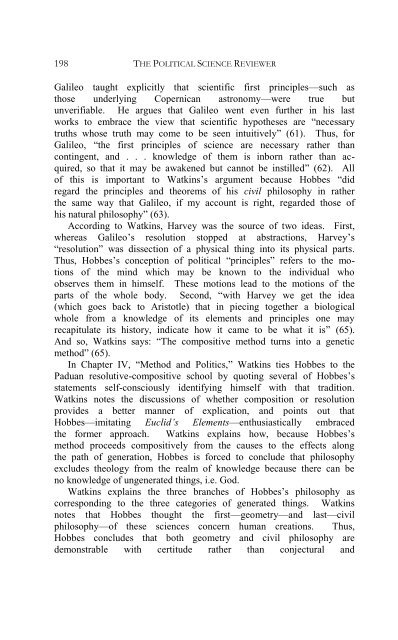Strauss and Watkins on Hobbes' Political Philosophy: A Review
Strauss and Watkins on Hobbes' Political Philosophy: A Review
Strauss and Watkins on Hobbes' Political Philosophy: A Review
You also want an ePaper? Increase the reach of your titles
YUMPU automatically turns print PDFs into web optimized ePapers that Google loves.
198 THE POLITICAL SCIENCE REVIEWER<br />
Galileo taught explicitly that scientific first principles—such as<br />
those underlying Copernican astr<strong>on</strong>omy—were true but<br />
unverifiable. He argues that Galileo went even further in his last<br />
works to embrace the view that scientific hypotheses are “necessary<br />
truths whose truth may come to be seen intuitively” (61). Thus, for<br />
Galileo, “the first principles of science are necessary rather than<br />
c<strong>on</strong>tingent, <str<strong>on</strong>g>and</str<strong>on</strong>g> . . . knowledge of them is inborn rather than ac-<br />
quired, so that it may be awakened but cannot be instilled” (62). All<br />
of this is important to <str<strong>on</strong>g>Watkins</str<strong>on</strong>g>’s argument because Hobbes “did<br />
regard the principles <str<strong>on</strong>g>and</str<strong>on</strong>g> theorems of his civil philosophy in rather<br />
the same way that Galileo, if my account is right, regarded those of<br />
his natural philosophy” (63).<br />
According to <str<strong>on</strong>g>Watkins</str<strong>on</strong>g>, Harvey was the source of two ideas. First,<br />
whereas Galileo’s resoluti<strong>on</strong> stopped at abstracti<strong>on</strong>s, Harvey’s<br />
“resoluti<strong>on</strong>” was dissecti<strong>on</strong> of a physical thing into its physical parts.<br />
Thus, Hobbes’s c<strong>on</strong>cepti<strong>on</strong> of political “principles” refers to the mo-<br />
ti<strong>on</strong>s of the mind which may be known to the individual who<br />
observes them in himself. These moti<strong>on</strong>s lead to the moti<strong>on</strong>s of the<br />
parts of the whole body. Sec<strong>on</strong>d, “with Harvey we get the idea<br />
(which goes back to Aristotle) that in piecing together a biological<br />
whole from a knowledge of its elements <str<strong>on</strong>g>and</str<strong>on</strong>g> principles <strong>on</strong>e may<br />
recapitulate its history, indicate how it came to be what it is” (65).<br />
And so, <str<strong>on</strong>g>Watkins</str<strong>on</strong>g> says: “The compositive method turns into a genetic<br />
method” (65).<br />
In Chapter IV, “Method <str<strong>on</strong>g>and</str<strong>on</strong>g> Politics,” <str<strong>on</strong>g>Watkins</str<strong>on</strong>g> ties Hobbes to the<br />
Paduan resolutive-compositive school by quoting several of Hobbes’s<br />
statements self-c<strong>on</strong>sciously identifying himself with that traditi<strong>on</strong>.<br />
<str<strong>on</strong>g>Watkins</str<strong>on</strong>g> notes the discussi<strong>on</strong>s of whether compositi<strong>on</strong> or resoluti<strong>on</strong><br />
provides a better manner of explicati<strong>on</strong>, <str<strong>on</strong>g>and</str<strong>on</strong>g> points out that<br />
Hobbes—imitating Euclid’s Elements—enthusiastically embraced<br />
the former approach. <str<strong>on</strong>g>Watkins</str<strong>on</strong>g> explains how, because Hobbes’s<br />
method proceeds compositively from the causes to the effects al<strong>on</strong>g<br />
the path of generati<strong>on</strong>, Hobbes is forced to c<strong>on</strong>clude that philosophy<br />
excludes theology from the realm of knowledge because there can be<br />
no knowledge of ungenerated things, i.e. God.<br />
<str<strong>on</strong>g>Watkins</str<strong>on</strong>g> explains the three branches of Hobbes’s philosophy as<br />
corresp<strong>on</strong>ding to the three categories of generated things. <str<strong>on</strong>g>Watkins</str<strong>on</strong>g><br />
notes that Hobbes thought the first—geometry—<str<strong>on</strong>g>and</str<strong>on</strong>g> last—civil<br />
philosophy—of these sciences c<strong>on</strong>cern human creati<strong>on</strong>s. Thus,<br />
Hobbes c<strong>on</strong>cludes that both geometry <str<strong>on</strong>g>and</str<strong>on</strong>g> civil philosophy are<br />
dem<strong>on</strong>strable with certitude rather than c<strong>on</strong>jectural <str<strong>on</strong>g>and</str<strong>on</strong>g>
















